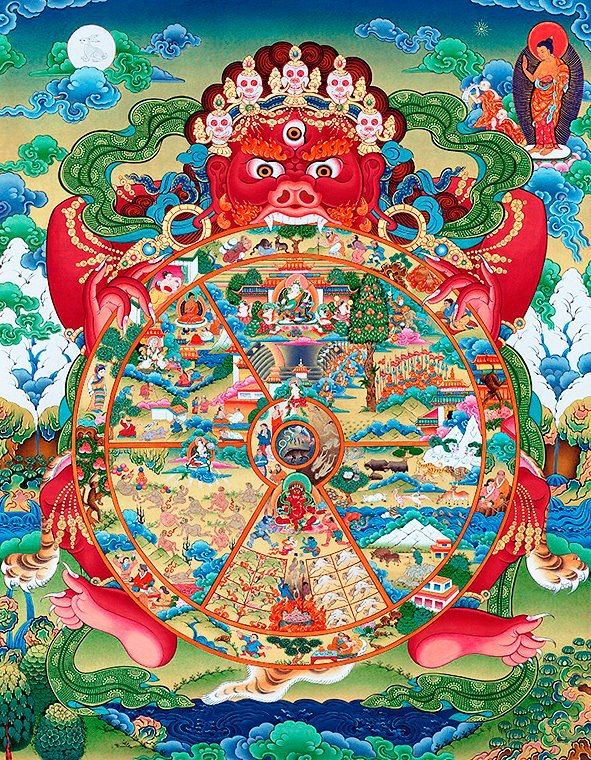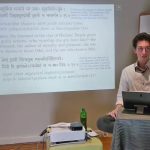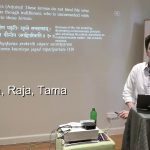That I attempt to be different, Is samsara.

“That I attempt to be different, is saṃsāra”.
To see how this is true, let's first ask…
What is saṃsāra?…
It is mistakenly seeing one's own thoughts and emotions (Subjective reality; prātibhāsika) — including the Objective reality (vyāvahārika) to be the final Reality (unchanging pure Consciousness; pāramārthika Brahman).
Why does one confuse these 3 realities, which causes saṃsāra? Because of unresolved Ignorance (avidyā).
WHAT DOES ALL THIS MEAN?
Every individual has a subtle body (in Sanskrit called sūkṣma-śarīra).
Sūkṣma-śarīra consists of the MIND (manaḥ: emotions), INTELLECT (buddhi: calculating/deciding), MEMORY (citta: past), and ‘I-sense' (aham kāra).
Knowing that, since when do your EMOTIONS, INTELLECT, and MEMORY ever remain constant? Never.
Nobody can say “I had the exact same thought/emotion, with the same intensity, texture and quality from moment I awoke, to moment before sleep.”
In reality, our sukshma-sharira undergoes hundreds of thoughts each day, most being repetitive, discouraging and inappropriate. Giving most of them importance, is saṃsāra!
Thus naturally we are motivated to keep modifying the condition of the sūkṣma-śarīra to suit our ideal version of how reality SHOULD feel like.
To accomplish this, we resort to either manipulating the external environment, which in extreme cases can lead to archetypes such as the charmer, the control-freak, the computer gamer, the over-achiever.
All for sake of managing the wild, untamed, undisciplined and loud mind.
Relate to this?
Put simply, “I don't like how I feel! So I keep BECOMING something different to feel better”. This is typical saṃsārī thinking.
This is an example of saṃsārī caught up in one's own bubble, one's own world (prātibhāsika).
Now let's talk about a saṃsārī who is predominately vyāvahārika oriented.
Meaning, majority of time-effort is invested into studying the OBJECTIVE world of phenomena, like perceptible Universe and laws that we all agree to collectively.
Suppose the person isn't so much under the spell of prātibhāsika as seen above. They enjoy a greater sense of objectivity, keeping with the facts. They can even identify “my stuff” from “facts”.
However he or she is involved in various Sciences. Mastering, discovering and improving the Objective Reality. Like studying the body, medicine, cosmos.
They may even spend a lifetime attempting to discover the smallest “God” particle. Perhaps find life forms on other planets. Maybe they study psychology. Or to bring a positive difference to the world.
All these are common good-hearted, committed and intelligent citizens who have made significant improvements in qualify of living. Our prostrations to the Scientist, Therapist, Biologist, Chemist, Doctor, Engineer, Physicist, etc.
However in reference to samsara, most of these individuals also get caught up in their line of work.
Even the smartest scientist will treat the Objective Reality to be the ABSOLUTE Reality (pāramārthika).
The objective person may not be under spell of prātibhāsika, but they're under spell of vyāvahārika. Both are samsaris as long as one remains ignorant of the final reality (pāramārthika).
 This is proven through your own experience. The more you look, the more you find! The more we get caught up in what we found.
This is proven through your own experience. The more you look, the more you find! The more we get caught up in what we found.
Vyāvahārika is a like a FRACTAL. Each zoom level reveals another world of itself as intricate and interesting as the previous zoom level.
Eventually, when one is no longer lured and fascinated by his-her Subjective preferences and Objective changing phenomena of the world — then saṃsāra gradually loses grip on the sukshma-sharira.
The person starts to turn more often inwards, eventually contemplating not only about the cosmos, but how does it all relate to myself.
Finally, let's answer why samsara causes insecurity, anxiety about the future and unnecessary over-thinking?
Thinking one's thoughts are important, or believing world is the final reality — the individual ends up clinging to either.
The pratibhasika oriented sukshma-sharira clings to one's notions and beliefs.
The vyavaharika oriented sukshma-sharira clings to one career and knowledge of the relative world.
Yet both the notions and anything with the relative world is temporary. Neither offer permanent security.
And so one holds on to the temporary in name of security and need to identify with something. Neither know of the one permanent, limitless reality called Brahman, which the individual happens to be.
Result of not knowing one's ever-secure, ever-full nature, can be none other then an agitated and anxious mind. A mind obsessed with accumulating and preserving.
In fact, why do we hold onto things, even if we logically know they won't last forever? Because for the time being, it gives one an illusionary sense of security and SATISFACTION.
And because it's illusionary, while it produces a form of security, it simultaneously brings FEAR.
Fear of course is the flip side of the samsara coin; with security on the other side.
And what's the root cause of fear?
False notion that “I am this sūkṣma-śarīra”, which is nothing but anr instrument where all emotions/thoughts are generated and experienced.
Finally, what is something we can do to loosen up this false notion of being the body-mind, which reinforces samsara?
We can being by OBJECTIFYING our body, emotions and thoughts.
Instead of saying “I AM confused”, say “There is confusion KNOWN to me”.
Instead of saying “I like/dislike __”, say “I am aware that mind like/dislikes __”.
This kind of language will help create some distance from the instrument, which once identified with, the person gets caught up in samsara. We're not speak of escapism or denying our body-mind. Only reassessing our relationship with it so we become the master of our God given instrument.






start quote…
This is proven through your own experience: the more you look, the more you find! The more you get caught up in what you found.
That’s why vyāvahārika is a like a FRACTAL. Each zoom level reveals another world of itself as intricate and interesting as the previous zoom level.
Thus the journey of uncovering and exploring vyāvahārika – NEVER ENDS. And it’s a fascinating world which ends up stealing all time/effort from Jīva to discover and pursue “Who am I?”.
….end quote
Thank you so much for writing this. This really does describe my current experience, a never ending FRACTAL. I am a computer programmer and have been fascinated as I continue to master this craft. Lately I’ve learnt how to write code without comments meaning the code is itself self explanatory. I do this by giving descriptive names to the functions. And of course instead of writing big long functions each function calls other functions which have their own names and conceptual level and that’s like a different zoom level of fractals. I reminds me of a few weeks ago when you described the objective reality as ‘schemes within schemes’ and another thing it reminds me of is how many hours I can be stuck exploring Google Earth at different levels or exploring early MineCraft worlds (online multiplayer world). It goes on forever, as you say. And there is never lasting satisfaction…
… and so my mind is again turned toward the highest goal: moksa.
Having a good reason to want moksa is important in order to devote more time toward it.
I will remind myself of the above lesson whenever I see I’ve succumbed to the endless fascination of fractal reality (vyāvahārika).
Then again, what if my fascination of Advaita Vedanta is just another phase or zoom level?
Well it certainly seems like a healthy fascination to have!
At beginning we said in class “Vedānta” is a throw away. Because Vedānta is indeed just another zoom level within the fractal. However it’s job is to negate the entire fractal by educating the individual that fractal (Īśvara) serves it’s purpose… to teach Jīva that “I am NOT the fractal, and fractal has nothing to do with me, it’s just appearance changing in infinite forms for eternity”.
In fact the fractal is Me (you; Ātman), but I (you: Ātman) am not the fractal. Owning to this knowledge, the fractal has ZERO fascination power to jñāni (wise person).
IE: Highest purpose within fractal is to realize: I am the substratum upon which the entire fractal depends on for it’s existence.
While other schools, not being aware of this endless and attractive scheme within scheme, end up shifting the sādhaka (aspirant) from one zoom level to a more appealing zoom level. Then sādhaka feels “I am evolving/growing! Yipee!”, but one is unknowingly diving in endless ocean of beautiful saṃsāra, which has no beginning.
Diving literally NEVER ends until guru comes (owning to sādhaka’s readiness) and helps one lose attraction for saṃsāra by exposing it’s essence-less nature (eg: beautiful female under microscope zoom level is just molecules, or we only experience worthwhile happiness for fraction of our lives on earth, or having a body = constant attendance to it’s hunger/demands).
Vedānta’s only job is to get the person out of saṃsāra. Not into a better version of it. Yes, it’s Knowledge is also saṃsāra, but when it’s taught by guru, then it’s Knowledge ends saṃsāra. While knowledge of (for example) physics or carpentry continues the saṃsāra… because it’s prettifying/modifying the world of vyāvahārika.